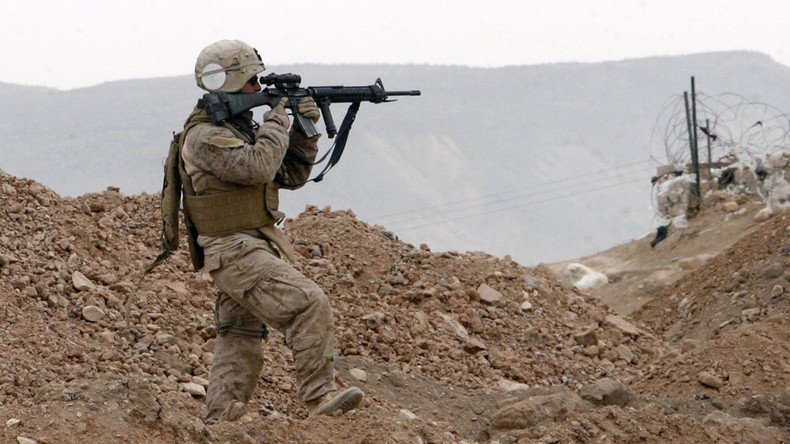‘I helped create ISIS’: Iraq War veteran says US policy caused 'blowback' in Middle East

Saying he had “helped create ISIS,” an Iraq War veteran and US Marine is speaking out about the atrocities and criminal activities he and his fellow soldiers engaged in during the Iraq War, claiming he knew it would lead to “blowback” in the Middle East.
Former Marine Vincent Emanuele’s acknowledgement of responsibility comes in an article that was posted on TeleSUR’s English website, in which he hoped to answer the often raised question of “Where did ISIS come from?”
“When I was stationed in Iraq with the 1st Battalion, 7th Marines, 2003-2005, I didn’t know what the repercussions of the war would be, but I knew there would be a reckoning,” he wrote at TeleSUR. “That retribution, otherwise known as blowback, is currently being experienced around the world (Iraq, Afghanistan, Yemen, Libya, Egypt, Lebanon, Syria, France, Tunisia, California, and so on), with no end in sight.”
Vincent Emanuele, ex-marine, invites you to see the black horror and barbarism that is the US military. https://t.co/UMrGHs9aud
— Mark Stoval (@MarkStoval) December 23, 2015Speaking with RT, Emanuele said his enlightenment came on his second tour to Iraq and was the result of a simple question.
“I saw my fellow Marines kill innocent people, torture innocent civilians, destroying property, mutilating dead bodies, running over dead corpses, laughing and photographing people while doing so,” he said. “For me it was very simple. I sat there in Iraq and I asked myself ‘How would I behave?’ ‘What would I think if I was in the shoes of the Iraqi people?’”
In his article, Emanuele described how he and his platoon literally trashed Mesopotamia by throwing garbage out of their Humvee, and pelting children with Skittles, water bottles full of urine, rocks, and debris. He remembers stories told by soldiers of torture carried out on detainees in makeshift detention facilities.
“I vividly remember the marines telling me about punching, slapping, kicking, elbowing, kneeing and head-butting Iraqis. I remember the tales of sexual torture; forcing Iraqi men to perform sexual acts on each other while marines held knives against their testicles, sometimes sodomizing them with batons,” wrote Emanuele.
This would have been at the height of the Abu Ghraib prison scandal in 2003, which came to public attention when Amnesty International published reports of human rights abuses by the US military and its coalition partners at detention centers and prisons in Iraq. One former prisoner of the US who survived was Abu Bakr al-Baghdadi, who is now the leader of Islamic State (IS, formerly ISIS/ISIL).
Abu Ghraib 2.0? Horrifying images of US Marines burning Iraqis prompt military investigation http://t.co/OQzLK0IoJR
— RT America (@RT_America) January 15, 2014Emanuele said he began educating himself during his second tour by talking to family and friends and engaging in the work of anti-war activists and intellectuals like Howard Zinn, Noam Chomsky, and Amy Goodman, as well as learning about the activities of groups such as Veterans for Peace, Iraq Veterans Against the War, and Vietnam Veterans against the War. This helped him contextualize his anecdotal experience.
“I knew what I was seeing was wrong, I knew it was immoral, I knew it was unjust, I knew it was illegal,” said Emanuele to RT, “and I knew that we would pay severe consequences in the form of the blowback as we are seeing with groups like ISIS. I knew those things were going to happen back then just from being a self-conscious person.”
‘There is a strategy’: Pentagon prepping new ‘narrative’ for war against ISIS
https://t.co/HiheUMEeZwpic.twitter.com/LXlKQvwUuT
— RT America (@RT_America) December 29, 2015He said he had to come to terms with what he had participated in, and that he viewed the war as part of a long history of US aggression that wasn’t just about Iraq and Afghanistan, or the wars in Vietnam or Korea. It goes back to the genocidal practices employed against Native Americans, African-American slaves, and people in South and Latin America.
‘More devastating than any nuclear war’: John McAfee on the coming cyber war with ISIS
https://t.co/G2zap1fv1wpic.twitter.com/RpuXhyTlSc
— RT America (@RT_America) December 17, 2015Emanuele told RT he hoped his article would better inform people – especially in the US – about what the US was doing and is doing around the world. He also said the article had a cathartic purpose.
“A lot of what I write, a lot of what I think about, is done not only for political reasons, not only to hopefully educate and better inform people, but also to help myself. In a very selfish way to keep myself alive and motivated and interested,” said Emanuele.
“All too many victims of war and veterans, particularly these wars in Iraq and Afghanistan and the broader Middle East, in North Africa and the drone strikes – they are destroying people’s lives. I think the more veterans can come out, particularly veterans in the US and also veterans across the broader West, if they can come out and speak openly and honestly about their experiences overseas, I think the less likely we will be to engage in these wars of aggression.”













